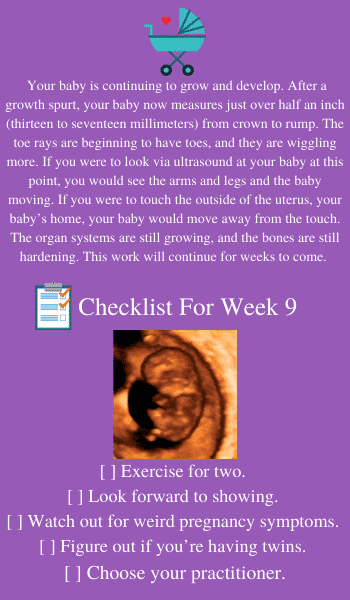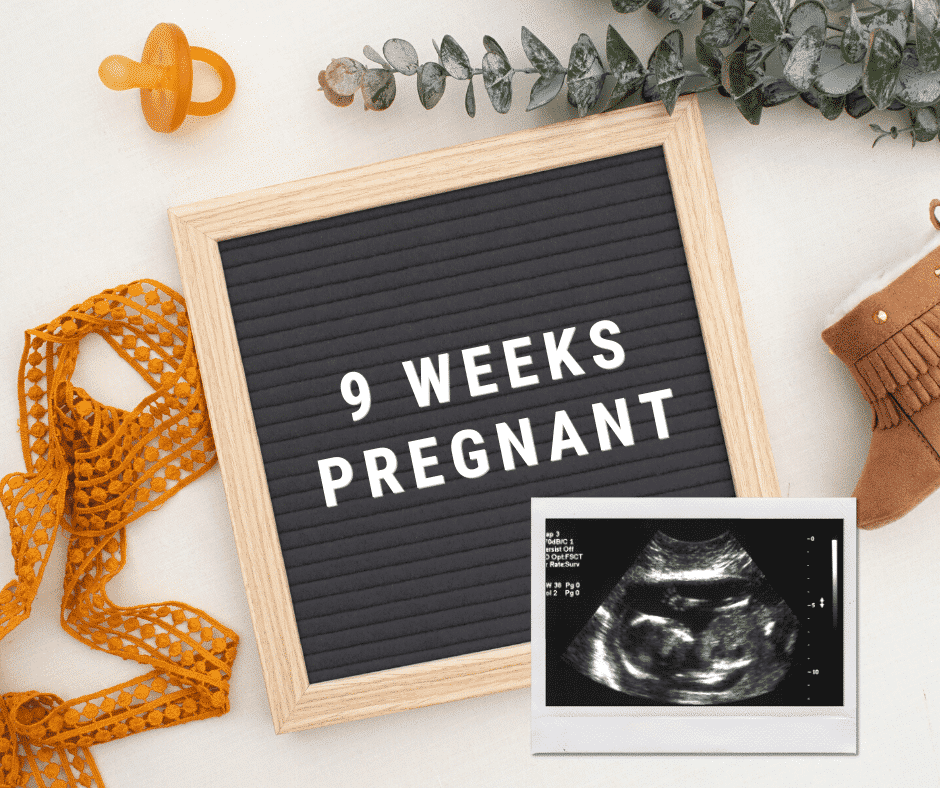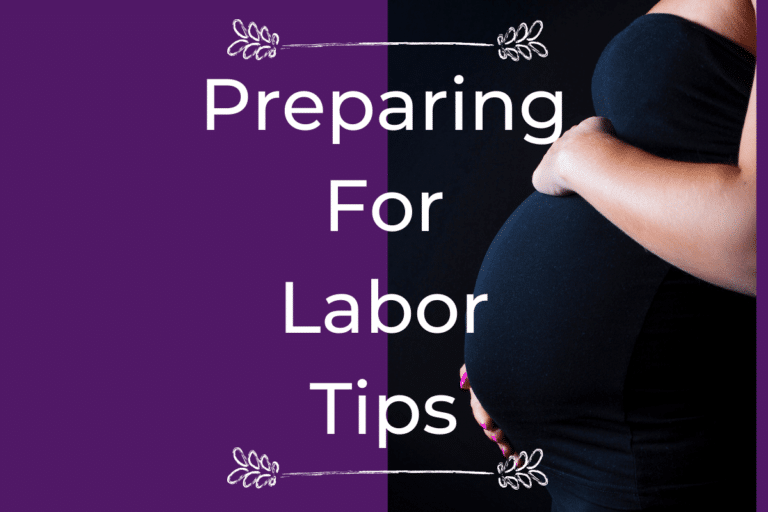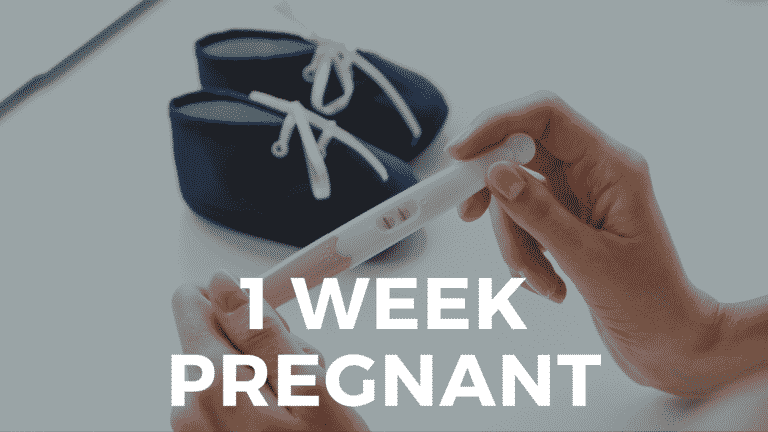9 Weeks Pregnant: Baby Development, Symptoms & Signs
Published on March 20, 2022 – Last Updated on April 22, 2022
Are you 9 weeks pregnant and want to know what to expect over the next few weeks? As a mother, you want to ensure that you provide your child with the best possible start in life. By staying healthy and taking care of yourself during pregnancy, you can help set your child up for a lifetime of good health.
In this blog, we will discuss the most common symptoms and tips on how to manage them. So, eat healthily and be comfortable during your pregnancy by following these simple tips!
Pregnancy Symptoms during your 9th week of pregnancy
Many moms-to-be start to feel more energetic during their 9th week of pregnancy, though some still experience fatigue. You may also notice more changes in your breasts, including increased size and tenderness. Other common symptoms include:
• mood swings
• constipation
• nausea and vomiting (especially in the morning)
• heartburn or indigestion
• increased urination
• dizziness or lightheadedness
• craving or aversion to certain foods
If you’re having trouble coping with any of these symptoms, be sure to talk to your health care provider. He or she can give you advice on how to manage them and may prescribe medications if necessary.
About the size of the baby
During pregnancy week 9th, your baby is the size of a blueberry.
Common symptoms at 9 weeks pregnant include:
Fatigue
You may experience fatigue during your 9th week of pregnancy. It is due to the hormonal changes in your body. Try to get plenty of rest and take naps during the day if possible.
Nausea
Many women experience nausea during their first trimester of pregnancy. This is caused by the increase in hormones in your body. To help manage nausea, eat small, frequent meals and avoid greasy or spicy foods.
Breast tenderness
You may see that your breasts are beginning to swell and feel tender. This is due to the increase in hormones in your body. To help relieve breast tenderness, wear a supportive bra and avoid caffeine.
Constipation
Constipation is a common symptom during pregnancy. To help relieve constipation, eat plenty of high-fiber foods and drink plenty of fluids.
If you are experiencing any other early pregnancy symptoms that are concerning, or if you simply have questions about your pregnancy, be sure to contact your healthcare provider. They will give you the specific advice and information that you need.
Hormonal Changes
During this time, you may feel hormonal changes. Some women feel more moody and emotional than usual, while others increase energy. These all are due to the Pregnancy hormone; accepting these changes as a natural part of pregnancy can help make the process a little easier.
Heartburn and indigestion
Heartburn and indigestion are common during pregnancy. This is due to the increase in pregnancy hormones in your body and the pressure of the growing baby on your stomach. To help relieve heartburn and indigestion, eat small, frequent meals and avoid spicy and greasy foods.
Mood swings
Mood swings are common during pregnancy. It is due to the hormonal changes that are happening in your body. To help manage mood swings, try to get plenty of rest and exercise regularly.
Pregnancy can be a wonderful time, but it can also be challenging. By following these simple tips, you can help ensure that you have a healthy and comfortable pregnancy.
Spotting or light bleeding
Spotting and light bleeding are expected during the early stages of pregnancy. This is usually caused by the implantation of the embryo in the uterus. If you are experiencing spotting or light bleeding, be sure to contact your healthcare provider for advice.
Pain in the ribs or abdomen
In the 9th pregnancy week, you may get minor pain in the ribs or abdomen. It is mainly due to the hormonal changes and the growing baby in your body. If you are experiencing any pain that is concerning, or if you simply have questions, be sure to contact your healthcare provider.
Vomiting and diarrhea
You may have vomiting and diarrhea during your 9th week of pregnancy. It is often due to a virus or stomach bug. To help relieve symptoms, drink plenty of fluids and eat bland foods.
Changes in your body and baby
During the 9th week of pregnancy, You maybe notice several changes in your body and baby.
Tender, swollen breasts.
You may need a giant bra to support your growing sore breasts.
Darker, larger areolas.
The area around your nipples may darken and enlarge during pregnancy.
Nausea and vomiting (morning sickness)
This is often called “morning sickness,” but it can occur at any time of the day.
Fatigue
You may feel more tired than usual, especially during the third trimester, due to the body’s weight gain.
Constipation.
During pregnancy, this is common as your body slows down digestion to absorb nutrients better.
Frequent urination.
You may find you have to go to the bathroom more often, especially in the evening.
Miscarriage.
Up to 1 in 5 pregnancies end in miscarriage, but most are due to abnormalities that are not detectable until after the pregnancy is confirmed.
Spotting or light bleeding.
This may be caused by the implantation of the embryo in the uterus.
Fetal development during Pregnancy Week 9th
During the 9th week of Pregnancy, Your baby will be about the size of a grape. Your baby’s eyes, ears, and nose are now in position and will continue to develop. The skin is translucent and see-through at first but thickens and becomes more opaque over time. The umbilical cord is fully formed, and the baby’s heart is pumping about 150 gallons of blood per day. Your baby’s brain is proliferating and developing nerve cells. Bone marrow begins to produce blood cells. The baby can grip its thumb and suck it.
Pregnancy can be a wonderful time, but it can also be challenging. By following these simple tips, you can help ensure that you have a healthy and comfortable pregnancy.
9 Weeks Fetus
9 weeks is an essential time for a fetus. This is when the baby’s heart starts to beat, and the brain and spinal cord begin to form. The baby’s limbs are also growing, and pregnancy begins to show. 9 weeks is an essential time for the mother, too. She may be feeling more tired and nauseous as the pregnancy progresses. However, 9 weeks is also a time of great excitement, as the mother begins to feel her baby move and grow.
9 Weeks Belly
As any experienced mother will tell you, a 9-week pregnant belly is nothing to worry about. It’s perfectly normal for your stomach to look a little rounder and fuller during this stage of pregnancy. The extra weight is due to the growing baby, the placenta, and the amniotic fluid. So don’t fret if you start to see extra padding around your waistline. Just remember to listen to your body and get plenty of rest. And before you know it, you’ll be holding your little one in your arms.
Tips for a healthy pregnancy
- Get plenty of rest
- Eating Smaller meals
- Avoid greasy or spicy foods
- Drink plenty of fluids
- Exercise regularly
- Don’t smoke or drink alcohol
Get plenty of rest – Like All Pregnant Women Should Get
As a Pregnant woman, you must take a good amount of rest. You will feel tired more often during the first trimester, and you must get enough rest to help reduce feelings of fatigue.
Eat small, frequent meals.
During your baby’s growth is, work hard to support your baby’s growth. It is critical to eat small, frequent meals to guarantee you receive all of the nutrients you require. This will help your body better digest and absorb the nutrients from your food.
Avoid greasy or spicy foods.
Greasy and spicy foods can be complex for your digestive system to process during pregnancy. Additionally, they may cause nausea and vomiting. To avoid these unpleasant side effects, try to avoid greasy and spicy foods during your pregnancy.
Drink plenty of fluids
It is essential to drink plenty of fluids during pregnancy, especially in the first trimester. Dehydration can cause fatigue, nausea, and vomiting. So drink plenty of water, juice, and milk to stay hydrated during your pregnancy.
Exercise regularly
Pregnancy is not an acceptable excuse for avoiding physical exercise. On the contrary, it is both safe and helpful to exercise throughout pregnancy. Exercise can help reduce the risk of gestational diabetes and preeclampsia and help you feel more comfortable during your pregnancy. However, be sure to speak with your healthcare provider before beginning an exercise program, and remember to start slowly and gradually increase the intensity over time.
Don’t smoke or drink alcohol.
During pregnancy, smoking and drinking alcohol are not recommended. Smoking can increase the risk of miscarriage, premature birth, and low birth weight. Additionally, it can also lead to health problems for your baby later in life. Drinking alcohol during pregnancy can cause fetal alcohol syndrome, leading to your child’s physical and mental health defects. If you are pregnant, it is essential to abstain from smoking and drinking alcohol for your and your baby’s health.
Advice for Partners
As a partner and your wife pass through the 9th week of pregnancy, you may have to care for her more. This is the time when many women feel exhausted and need more rest. You may help by performing some of the household tasks and errands. You should also make sure she eats healthy foods and gets enough to drink. A warm or cold compress can ease a headache and rest.
Many Suggest that you take your wife to the park and go for a walk with her. Fresh air and activity might help her energy levels. If she feels up to it, you can also try some light yoga or stretching exercises together.
9 Weeks of Pregnancy Ultrasound

Make sure to check out our Pregnancy Week by Week post where you can find great information for each stage of pregnancy based on weeks.
At 8 weeks, your baby is still tiny, but this is the week when the heartbeat can usually be detected. You may also have an ultrasound at this time to check on the baby’s development. The ultrasound will show how the baby is growing and help determine the due date.
The heartbeat can usually be detected by placing a transducer on the mother’s abdomen. If a Doppler is used, the technician will listen for a whooshing sound that is characteristic of the heartbeat. If no sound can be detected, it may be necessary to perform an ultrasound to check for the baby’s development problems.
Prenatal Visit
Make Sure to have a regular Prenatal visit at the 9th week of pregnancy. This is a necessary time to check in with your healthcare provider and make sure everything progresses smoothly. You’ll probably have a physical examination and a urine test. Your blood pressure will also be checked.
Your healthcare provider or doctor will also ask about your symptoms and how you feel overall. This is an excellent time to ask any questions you may have about your pregnancy. Keep track of your symptoms and notify your doctor so that they can keep an eye on you.
FAQs
Why is Week 9 of pregnancy the worst?
There is no one answer to this question, as every woman’s pregnancy experience is different. However, many women report feeling exhausted and nauseous during the first trimester, typically peaking around Week 9. Additionally, many of the common symptoms of pregnancy, such as morning sickness and fatigue, can be incredibly unpleasant during Week 9. If you are experiencing discomfort or problems during this week, be sure to speak with your healthcare provider.
How does your stomach feel at 9 weeks pregnant?
Some women report feeling increased pressure and discomfort in their stomachs as they enter the second trimester. This is often due to the growing baby pushing against the stomach and intestines. You may also experience constipation and the baby’s heartbeat during this time. If you are experiencing any uncomfortable or painful symptoms, be sure to speak with your healthcare provider.
Can you feel the baby moves at 9 weeks pregnant?
Some women report feeling movement from their babies as early as Week 9. However, movement will become more consistent and noticeable for most women as they enter the second trimester. If you are feeling any movement, be sure to share it with your healthcare provider so they can monitor the baby’s development.
What should you avoid at 9 weeks pregnant?
There are several things you should avoid during the ninth week of pregnancy. These include smoking, drinking alcohol, and caffeine. Additionally, you should avoid raw meat, unpasteurized milk, and processed foods. It is also essential to avoid contact with chemicals and toxic substances. If you have any questions about what you should or shouldn’t be doing during pregnancy, be sure to speak with your healthcare provider.
What can I do to ease 9 weeks pregnant symptoms?
There are several things you can do to help ease pregnancy symptoms. These include getting plenty of rest, eating small meals throughout the day, and avoiding spicy or fatty foods. You should also avoid standing for long periods and wear comfortable, supportive shoes. If you are experiencing any severe symptoms, be sure to speak with your healthcare provider.
Other Pregnancy Weeks:
- 1 Week Pregnant
- 2 Weeks Pregnant
- 3 Weeks Pregnant
- 4 Weeks Pregnant
- 5 Weeks Pregnant
- 6 Weeks Pregnant
- 7 Weeks Pregnant
- 8 Weeks Pregnant
- 10 Weeks Pregnant
- 11 Weeks Pregnant
- 12 Weeks Pregnant
- 13 Weeks Pregnant
- 14 Weeks Pregnant
- 15 Weeks Pregnant
- 16 Weeks Pregnant
- 17 Weeks Pregnant
- 18 Weeks Pregnant
- 19 Weeks Pregnant
- 20 Weeks Pregnant
- 21 Weeks Pregnant
- 22 Weeks Pregnant
- 23 Weeks Pregnant
- 24 Weeks Pregnant
- 25 Weeks Pregnant
- 26 Weeks Pregnant
- 27 Weeks Pregnant
- 28 Weeks Pregnant
- 29 Weeks Pregnant
- 30 Weeks Pregnant
- 31 Weeks Pregnant
- 32 Weeks Pregnant
- 33 Weeks Pregnant
- 34 Weeks Pregnant
- 35 Weeks Pregnant
- 36 Weeks Pregnant
- 37 Weeks Pregnant
- 38 Weeks Pregnant
- 39 Weeks Pregnant
- 40 Weeks Pregnant
- Birth Plan
- Baby Due Date Calculator
- EDD Calculation
- how many weeks pregnant I am
Thanks For Reading!







